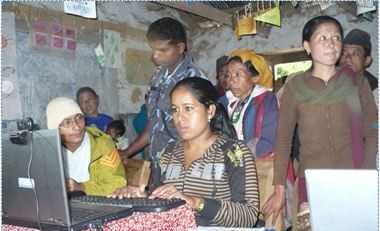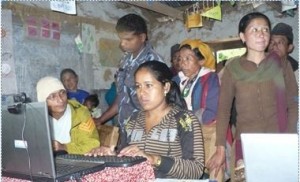Tamku, NP – Micro hydro-electricity makes study easier – 31 Dec 2012
 Three hundred children are now able to study at night thanks to a hydro-electricity project. It supplies electricity to Tamku village, which improves the living and economic conditions for the families, by providing a source of power for the local nettle fiber industry by day, and light at night for the family homes.
Three hundred children are now able to study at night thanks to a hydro-electricity project. It supplies electricity to Tamku village, which improves the living and economic conditions for the families, by providing a source of power for the local nettle fiber industry by day, and light at night for the family homes.
Tamku is in Nepal’s eastern hills, where there are no roads, no wheeled vehicles, where landslides have made the area somewhat inaccessible during the rainy season, and where there has been no electricity or gas supply.
The nettle fiber industry involves the cultivation of the giant Himalayan Nettle, sustainable harvesting, fiber extraction using local improved appropriate technologies, spinning to produce nettle fiber, manufacture and sales of knitted items such as scarves and shawls, and woven items such as bags and belts. The revenue received provides income to the nettle workers, which is helping pay for the education costs for the girls and boys of the nettle workers’ families.
The main project objectives are:
- Micro-hydro sustainable electricity supply to the nettle industry and homes.
- Nettle cultivation
- Fiber processing with improved quality and greater quantity of spun thread, and reduction in health problems experienced compared to the traditional drop spindle technique.
- Marketing and promotion increasing the sales volume of nettle fiber, and related products from Tamku VDC, by at least 50%.
- New and improved job opportunities for girl and boy school leavers, both in the nettle fiber business and in other occupations.
1. Micro-hydro
Electricity supply has been increased from 125 households to 135 households during the reporting period. This means that 300 school attendees are now benefiting from the new micro-hydro electricity supply.
Good progress has been made in initiating nettle cultivation, which will improve the reliability of raw material supply for the newly-registered cottage industry for nettle, and take pressure off wild harvesting of dwindling supplies in the forest. 3 village level meetings with women producer groups were organized during the period, and individual producers were selected through discussion and based on the availability of Kharka (pastureland) for nettle cultivation on private land. As a result, individuals cultivated nettle on 72 ropanies (a ropany is 74ft by 74ft) in the project area of Sankhuwasabha district in April and May, 2012. Nettle cultivated this year can only be harvested annually from 2014 onwards. First steps have also been made for cultivating nettle on common land in the project area for 2012-13. This investment in the future will help assure continued raw material supplies in a sustainable way.
3. Fiber processing
The construction of a simple building for a newly-designed spinning machine with an adjacent room for raw material storage was carried with the assistance of a sub-overseer of Tamku Village Development Committee (VDC). Construction committee formation and stone collection activities were carried out before the monsoon. The construction committee decided to stop the construction activities for 2 and a half months (1st June to 15 August) to do their agricultural activities. After the break, the construction committee restarted the construction work with a target to complete the building by December 2012.
While the progress in housing the spinning machine has been good, the development of the first prototype village-scale set of machines for carding and spinning has been slower than hoped. Since it is a research based activity, the manufacturing of these machines is taking longer time than expected. However, Advance Automation, the small company in Kolkata that is working on the machines, has assured us that they will complete manufacturing the pilot machine, and transport and install it by January 2013. Transrural Trust is putting some extra pressure on the chief researcher to meet the deadline to which he is committed.
4. Marketing and promotion
The nettle producer groups of Tamku were affiliated to the newly registered community-own cottage industry that is based in Khandbari, the district HQ. Support was then provided to take part in national-level Fair Trade event organized by the Cottage and Small Industries agency. The nettle cottage industry stand won an award for being the best natural fibre handicraft group at the event. The award provided the representative of the group an opportunity to participate in a 12-day long exposure visit to some cottage industries in India.


